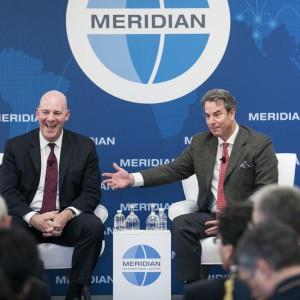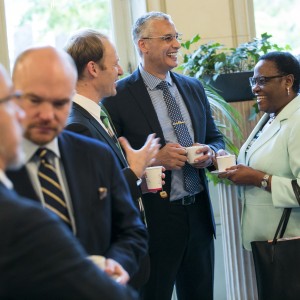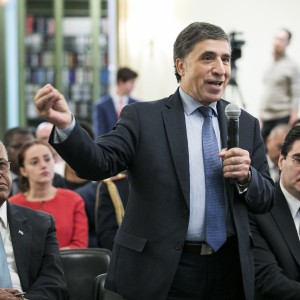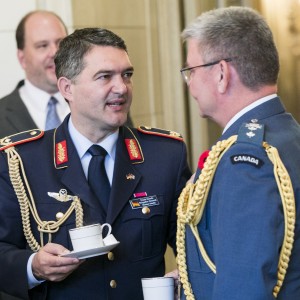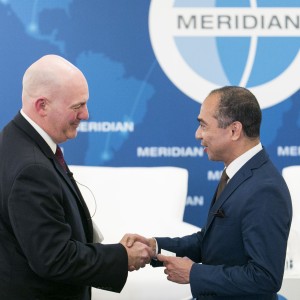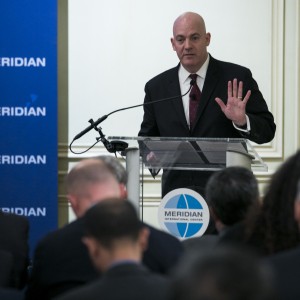America as the Partner of Choice: A Conversation with Assistant Secretary Clarke Cooper

For the first time since the Cold War, partnering with America on matters of defense and national security is no longer viewed as imperative, but as one of several options. On October 31st at Meridian International Center, Assistant Secretary of State for Political-Military Affairs R. Clarke Cooper made the case to an audience of ambassadors and defense attaches from around the world that the America remains the premier and unsurpassed global defense partner.
According to Cooper, United States competitors are turning to arms sales as a strategy to build international influence and weaken that of the United States. By offering aggressive pricing and accessibility, other countries have gained significant ground on America’s grasp as the world’s premier defense partner. Cooper, however, has a message: “buyer beware.”
With no doubt behind the quality of the United States’ equipment, Cooper went on to address the two major concerns countries raise when purchasing from the U.S.: cost and length of delivery time. President Trump attempted to respond to these criticisms with his signing of the 2018 Conventional Arms Transfer Policy, and Cooper enthusiastically announced the progress of the President’s policy. In the past six months, the time between arms requests and U.S. offers has been reduced by 9 percent. In addition, the Administration has reduced overhead fees from 3.5 to 3.2 percent, saving foreign partners 180 million dollars in the past year alone. However, it is more than just quality that separates the United States from its competitors as Cooper highlighted the transparency and trustworthiness that comes with a partnership with America. To end his address, Cooper concluded, “a partnership with America offers something a purchase from Russia or China never will: friendship.”
The event continued with a discussion between Cooper and Ambassador Stuart Holliday in which they discussed the role of the State Department in joint military operations. Cooper shared an anecdote that involved two allied countries that had both planned significant military exercises which, without proper communication, could have been viewed as an act of aggression. Cooper explained that through the broad global view afforded to the State Department, his office was able to avoid the miscommunication.
The conversation between Holliday and Cooper was followed by a robust question and answer session between Cooper and the high-level diplomats in attendance. During a dialogue with H.E. Madjid Bouguerra, Ambassador of Algeria, Cooper went on to clarify the role of the Countering America's Adversaries Through Sanctions Act (CAATSA), stating that the law was not put in place to jeopardize existing supply chains with Russia, but to mitigate any new major military acquisitions. Cooper continued by elaborating on the strained relationship between Turkey and NATO after the purchase of air defense systems from Russia and reiterated that this purchase resulted in Turkey’s expulsion from America’s F-35 program. The event continued with Cooper’s explanation of the United States’ position on the European Defense Fund in response to a question from H.E. Tihomir Stoytchev, Ambassador of Bulgaria. Cooper stated that the current language, while intended to increase the participation of smaller companies, may inadvertently shut them out and disrupt the current supply chain.
A full transcript of Secretary Cooper’s remarks can be found here: https://www.state.gov/america-as-the-partner-of-choice/
Insights@Meridian and other Meridian Center for Diplomatic Engagement programs serve to provide the international diplomatic corps with a better understanding of U.S. domestic policies from multiple perspectives. For more information, please visit meridian.org/diplomacy.
See more photos Learn more about Insights@MeridianProject summary
| America as the Partner of Choice: A Conversation with Assistant Secretary Clarke Cooper | October 2019 | |
|---|---|
| Number of Attendees: | 55 |
| Regions: | Africa, East Asia and Pacific, Europe and Eurasia, Near East and North Africa, South and Central Asia, Western Hemisphere |
| Countries: | Afghanistan, Algeria, Argentina, Azerbaijan, Bahrain, Bulgaria, Cambodia, Canada, Chile, Colombia, Cyprus, Fiji, Germany, Ghana, Greece, Iraq, Italy, Jordan, Republic of Kosovo, Lithuania, Morocco, Namibia, Nepal, New Zealand, Nicaragua, Peru, Qatar, Singapore, Slovenia, Sweden, Switzerland, Thailand, Timor-Leste, Uganda, United Arab Emirates, United Kingdom, Uzbekistan, Yemen, Zambia |
| Impact Areas: | Foreign Policy, Security and Defense |
| Program Areas: | Diplomatic Engagement |
| Partners: | Public Sector |
